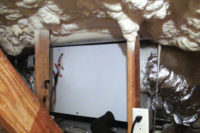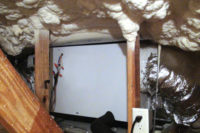
Education and training are necessary to increase awareness of the need for humidity control. Here Marc Cassel of Aprilaire works with the crew at Blue Dot Services of Maryland to conduct technical and sales training.
“There is no better sales opportunity than reacting to consumers who have problems with too dry or too humid air,” said Mike Rimrodt, marketing director for Aprilaire. “In fact, most consumers if asked will identify one of these problems.”
So that makes it simple: Contractors should focus on selling whole-home humidity control equipment if they want to grow their business and increase revenue.
SALES OPPORTUNITY
There are many reasons why humidification and dehumidification equipment provide an excellent sales opportunity for contractors. According to Barbara Dean-Hendricks, senior product marketing manager of IAQ products for Honeywell, the awareness of IAQ solutions among homeowners is growing as they seek solutions to address their discomfort. “HVAC contractors are in a prime position to offer solutions to deliver whole-home comfort.”She continued, “Furthermore, HVAC contractors are focusing more on content per job and adding profit to jobs, rather than just the number of jobs they complete. Adding IAQ accessories increases the profitability per job for their business.”
Rimrodt added that there is a proven success rate for sales of humidification and dehumidification equipment. “Contractors who quote IAQ products on 100 percent of their equipment bids report that 35 percent of their installs include at least one IAQ product.
“Not only should contractors focus on reacting to these consumers, they should proactively assume the problems exist and quote the products which provide the solutions.”
Of course, in order to effectively sell humidity control equipment, contractors must focus on educating consumers about the benefits of these products. If consumers are educated about humidity control, they will learn that going beyond the basic heating/cooling system can alleviate issues with comfort and health.

This chart by Skuttle IAQ Products shows how carefully controlled home humidification improves air quality. The narrowing blue wedges indicate reduced effectiveness of the corresponding health-endangering conditions. Bacteria, for example, are least effective in the 25-60 percent relative humidity range. *Insufficient data above 50% relative humidity.
REVIEWING RELATIVE HUMIDITY
A basic review of the effects of too dry/too humid air is a good place to start with customers. “Too dry/too humid can be more than just a comfort issue,” said Phil McConnell, a sales consultant for Therma-Stor LLC, manufacturer of Ultra-Aire ventilating dehumidifiers. “Improper humidity levels can cause health problems. Air that is too dry could cause sore throats, coughs, or nosebleeds. Too much moisture in the air leads to conditions suitable for biological growth such as mold, mildew, and dust mites. Exposure to these biologicals has been associated with allergies and asthma. In addition, indoor humidity levels affect the contents of the home such as woodwork, artwork, and furnishings, as well as the durability of the building itself.”It can also help to teach potential customers about the recommendation from the American Society of Heating, Refrigerating, and Air-Conditioning Engineers (ASHRAE) that the relative humidity in the home stays between 40 and 60 percent. A number of undesirable results can occur when humidity is too high or too low, as illustrated in the chart at right created by Skuttle IAQ Products. Bacteria, viruses, ozone production, asthma, and respiratory infections are all exacerbated when humidity is too low. Inversely, bacteria, viruses, and respiratory problems increase when humidity is too high, along with the presence of fungi and dust mites.
A thorough explanation of these issues will educate and inform consumers about the health risks associated with a lack of humidity control. Consumers are growing more and more conscious of IAQ-related issues related to allergies, mold, and other topics commonly reported on in the media. As their awareness increases, contractors can provide the education needed to turn consumers into customers.
WHY A/C ALONE ISN'T ENOUGH
Another important topic contractors can explain to consumers is why an air conditioner alone is not an effective way to dehumidify a structure. “In a typical heating/cooling system, the air conditioner is the only drying mechanism in a home. Contractors in humid parts of the country should recognize that moisture loads are not always associated with cooling loads, so the comfort system for these homes should address this issue,” McConnell said.Using only an air conditioner for dehumidification is an inefficient use of energy, added Dean-Hendricks. “Running the compressor and fan of even the most efficient equipment can use up to 14 amps to dehumidify. If the homeowner has less efficient equipment, this number can be 25-plus amps.”
She added, “There are many times of the year when it is too humid, but not too hot in the home. These times often occur in the shoulder seasons or when it is raining outside. Because there is no need to cool the home, the home and homeowner may suffer from too much humidity in the home without a good way to be comfortable. They either run the air conditioner to reduce the humidity and overcool the house, or live with the high humidity levels. A whole-house dehumidifier is great in these situations.”
As an example, McConnell mentioned that he recently heard of a homeowner who requested a contractor come out to provide a quote to replace the current 3-ton a/c unit with a larger unit.
“Interestingly, the 3-ton unit was able to easily maintain the homeowner’s desired temperature. But the homeowner still was not comfortable. As it turned out, the humidity was too high in the home. The perceived solution for both the homeowner and the contractor was a larger a/c unit capable of lower temperatures, but the real answer was a whole-house dehumidifier to complement the a/c and provide humidity control.”
This same principle applies to the commercial market, where customers also need to be educated about the difference between controlling temperature versus controlling humidity. According to Paul Stewart, sales/marketing/service director for Desert Aire Corp., contractors should focus on controlling the dew point of a customer’s facility. “The benefit of using the dew point as the controlling factor is that it helps a customer control his environment using a dehumidifier that functions on humidity levels rather than temperature. For example, on days where there’s no need for cooling yet the dew point is high, a dehumidifier can initiate operation to remove the humidity unlike air handling units or air conditioners which will energize only when they detect elevated temperatures.”

Offering humidity control products to current customers can increase contractor sales and revenue. This Honeywell Evaporative Humidifier is an example of an IAQ solution that improves whole-home comfort.
CLOSING THE DEAL
To close a successful sale of humidity control equipment, contractors may need to alleviate customer concerns about cost and comfort.McConnell noted that some consumers are concerned about the cost of operation of a whole-house system. “Contractors should create the expectation that healthy indoor air quality may cost a bit more than uncontrolled indoor air quality,” he said. “In addition, contractors should consider installing the most energy-efficient systems available to reduce operating costs. Contractors will also need to install the units correctly in order to maximize efficient operation.”
And, Dean-Hendricks added, contractors should explain to homeowners that humidity control can actually lower their utility bills. “It is important to note that your body feels cooler when the humidity level is lower,” she said. “This means that the homeowner can turn up the temperature a couple degrees when the home is properly dehumidified, helping the homeowner to save on their utility bills. Using a dehumidifier in the home therefore not only allows the homeowner to maximize comfort, but also does it in the most energy-efficient way.”
Capitalizing on the good points of humidification and dehumidification equipment can be an excellent way to increase sales and improve the comfort and health of customers. And contractors who sell humidity control as part of the overall package they present to customers may see a boost to their bottom line.
Sidebar: Humidity Helps Contractors
Contractors who have been hard-hit by the current recession should look at increasing sales of humidification and dehumidification equipment as a way to boost profits. While all the manufacturers contacted for this article reported that sales of humidification and dehumidification equipment are currently down, up-selling these products to current customers could provide a revenue boost to the bottom line.Aprilaire’s Mike Rimrodt said, “Many successful contractors, when evaluating where and how to expand their business, turn quickly to IAQ products. It’s a logical choice for a couple of reasons. The first is products that prevent too dry/too humid air can be sold to existing customers. All marketing experts agree the easiest way to grow a business is through existing customers. The second is that the need for these products exists with practically every customer.”
According to Honeywell’s Barbara Dean-Hendricks, the recession’s impact on construction has affected the HVAC market. “HVAC contractors who traditionally focused on new construction as their primary business have transitioned their focus to retrofit service jobs. Up-selling to increase content per job is the key to success and profit on retrofit services jobs.”
Skuttle’s John Duke Riley assured contractors that expanding their focus to humidification and dehumidification can indeed be profitable. “As with all other aspects of the contractors’ offers, there is a profit available for the installation, service, and replacement parts sales.”
Moreover, Riley said, the most common problem with humidifiers is a lack of service. “An informed homeowner can help with this, but the responsibility lies on the contractor to update and service the unit as part of a maintenance agreement.”
Publication date:08/09/2010






